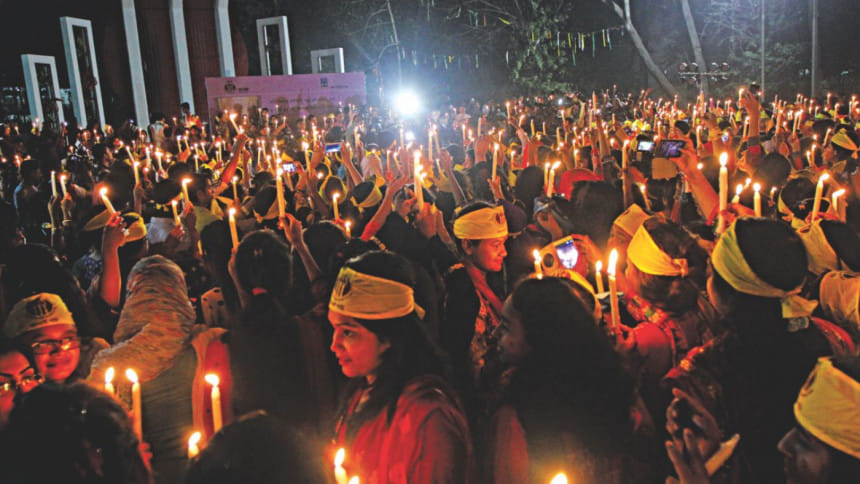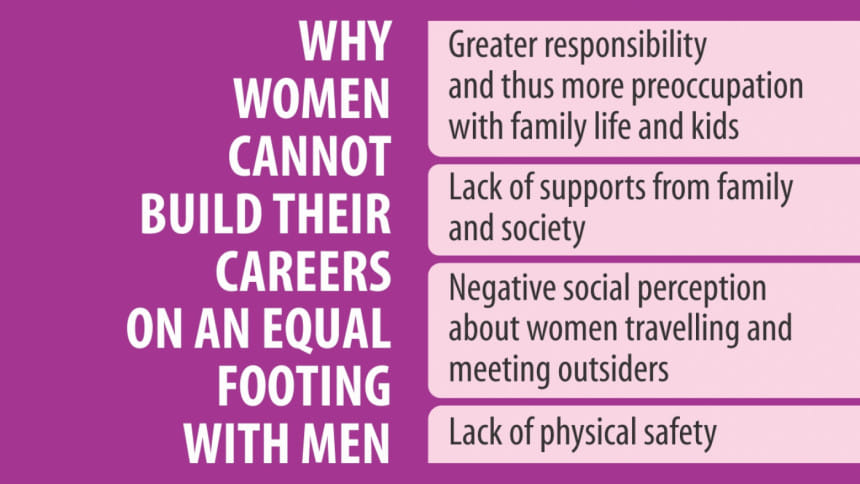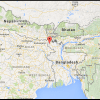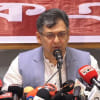Wait for leading role

Bangladesh returned to democracy in 1991 and since then the country has been ruled by two female leaders. In between, there had been around three years of interim periods, basically to hold elections. Bangladesh is also a rare country in the world where the two largest political parties are being led by two women for over the last three decades.
As of 2016, the Prime Minister of Bangladesh, the Speaker of Parliament, and the Leader of the Opposition are women. The BNP, which is one of the two largest political parties, is also led by a woman.
This could imply massive political empowerment of women in Bangladesh. But it does not mean women are doing well in the private sector, which is the major growth driver of Bangladesh's consistent and steady economic growth.
There are 56 banks and 33 non-bank financial institutions operating in Bangladesh and none of them are led by a woman. Two women work as deputy managing directors in two banks and there is another female additional deputy managing director.
Of the 77 insurance companies here, only two are led by women.
There are several thousand garment and textile factories, where majority of the workers are women, but it is hard to find a woman in the chief executive position unless the responsibility was inherited or imposed on them by their husbands or fathers.
It is even hard to find a woman in a managerial position in these companies and factories.
Sayeema Haque Bidisha, associate professor of economics at Dhaka University, referred to the National Labour Force Survey 2013 conducted by the Bureau of Statistics. The survey showed that women hold only 12 percent of the high-ranking jobs in industrial and service sectors.
Bidisha said many women were also engaged in self-employed work, often working without pay for their fathers' or husbands' businesses. In fact women exceed men in contributing as family helper, according to the survey.
Out of the total 10.55 million such workers, 80 percent are women.
So, why do women lag behind compared to their male counterparts? Why are they not in the leadership role in the growing economic activities?
The Daily Star talked to a number of women top executives, experts, and male chief executives to understand why women cannot build their careers on an equal footing with men.
Despite promising starts, marriage and having babies hold women back from taking up senior-level positions, according to Farzana Chowdhury, managing director and chief executive of Green Delta Insurance.
“Breaks in their [women] careers occur when they become pregnant. Later, they have to sacrifice their jobs to rear their children,” said Farzana, who became the first women CEO in the insurance sector.
Often, women do not get adequate support from their families and surroundings for building their careers, she said.

Mohammodi Khanam, chief executive officer of Prime Insurance, said women cannot take leadership roles in the corporate sector of Bangladesh after taking care of their children and families. “Conservative mindset of families and society hold women back,” she said.
Citing her own experience, she said it was not so easy to go up to the top level as a woman. “I had to fight at every level,” she said, adding that women need motivation and have to have strong will power to build their careers.
Adiba Rahman, additional managing director of Delta Life Insurance, said family becomes a woman's first priority, no matter how brilliant she is.
Helena Jahangir, who runs a number of factories, including garments, said the nature of the work in the garment sector doesn't allow a woman to hold managerial jobs.
There are issues like dealing with buyers and suppliers, which is tough for a woman to carry out, she said.
Her factories have 4,000 employees, most of them are women. But there is no woman in any managerial posts.
Mafizuddin Sarker, chairman of an association of non-bank financial institutions and managing director of BD Finance, said women were coming forward and doing extremely well in the sector.
“Presently, 10 to 15 percent women work at the mid-level of banks and financial institutions. The number is increasing gradually with the expansion of economic activities,” he said.
Bitopi Das Chowdhury, country head of corporate affairs of Standard Chartered Bank, Bangladesh, said while qualification and work experience matter the most, women need to give more effort to reach the top than their male counterparts.
Mentioning it was not so easy for women to travel for work or commute at night, she said, "In the context of Bangladesh, security and social responsibility is an issue for women.
"We do get a lot of talented women employees, but many leave their jobs midway of their careers because of social, familial, or situational factors.
"Our male colleagues can spend more time at work without worrying too much about home, but for women colleagues, the responsibilities at home are often more."
She said it was her determination of not giving up that brought her to the position she now holds.
Bitopi opined that the government could play a role in supporting women by enforcing the labour law that require day-care centres and nurseries in establishments with at least 50 women employees.
"A law to increase the paternity leave to about 2 months should also be enacted to help couples handle the initial responsibility of having a baby," she said.
Tania Haque, associate professor of Women and Gender Studies at Dhaka University, raised the question as to why day-care centres should only serve female employees.
"While it is true that babies need their mothers at a very young age, once they grow up a little, the fathers can look after them too," she said, suggesting that the “50 women employees” clause should be removed from the law.
Talking about the garment sector, Tania said, "We are using the cheap labour of women but have not built the infrastructure or had created the conducive work environment to help her climb the professional ladder."

 For all latest news, follow The Daily Star's Google News channel.
For all latest news, follow The Daily Star's Google News channel. 








Comments